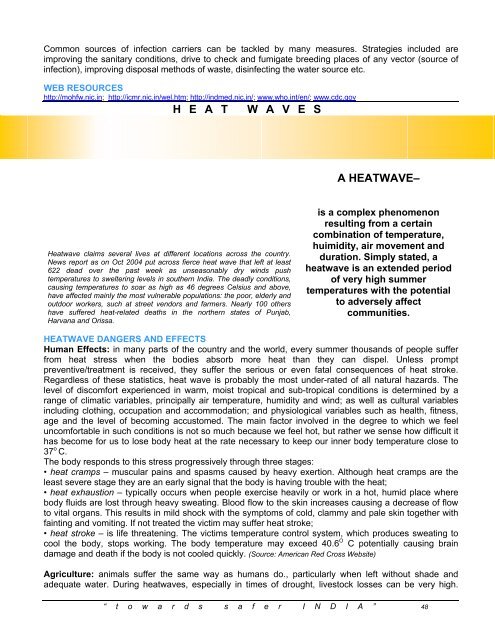Hazards, Disasters And Your Community - United Nations ...
Hazards, Disasters And Your Community - United Nations ...
Hazards, Disasters And Your Community - United Nations ...
You also want an ePaper? Increase the reach of your titles
YUMPU automatically turns print PDFs into web optimized ePapers that Google loves.
Common sources of infection carriers can be tackled by many measures. Strategies included are<br />
improving the sanitary conditions, drive to check and fumigate breeding places of any vector (source of<br />
infection), improving disposal methods of waste, disinfecting the water source etc.<br />
WEB RESOURCES<br />
http://mohfw.nic.in; http://icmr.nic.in/wel.htm; http://indmed.nic.in/; www.who.int/en/; www.cdc.gov<br />
H E A T W A V E S<br />
A HEATWAVE–<br />
Heatwave claims several lives at different locations across the country.<br />
News report as on Oct 2004 put across fierce heat wave that left at least<br />
622 dead over the past week as unseasonably dry winds push<br />
temperatures to sweltering levels in southern India. The deadly conditions,<br />
causing temperatures to soar as high as 46 degrees Celsius and above,<br />
have affected mainly the most vulnerable populations: the poor, elderly and<br />
outdoor workers, such at street vendors and farmers. Nearly 100 others<br />
have suffered heat-related deaths in the northern states of Punjab,<br />
Haryana and Orissa.<br />
is a complex phenomenon<br />
resulting from a certain<br />
combination of temperature,<br />
huimidity, air movement and<br />
duration. Simply stated, a<br />
heatwave is an extended period<br />
of very high summer<br />
temperatures with the potential<br />
to adversely affect<br />
communities.<br />
HEATWAVE DANGERS AND EFFECTS<br />
Human Effects: in many parts of the country and the world, every summer thousands of people suffer<br />
from heat stress when the bodies absorb more heat than they can dispel. Unless prompt<br />
preventive/treatment is received, they suffer the serious or even fatal consequences of heat stroke.<br />
Regardless of these statistics, heat wave is probably the most under-rated of all natural hazards. The<br />
level of discomfort experienced in warm, moist tropical and sub-tropical conditions is determined by a<br />
range of climatic variables, principally air temperature, humidity and wind; as well as cultural variables<br />
including clothing, occupation and accommodation; and physiological variables such as health, fitness,<br />
age and the level of becoming accustomed. The main factor involved in the degree to which we feel<br />
uncomfortable in such conditions is not so much because we feel hot, but rather we sense how difficult it<br />
has become for us to lose body heat at the rate necessary to keep our inner body temperature close to<br />
37 o C.<br />
The body responds to this stress progressively through three stages:<br />
• heat cramps – muscular pains and spasms caused by heavy exertion. Although heat cramps are the<br />
least severe stage they are an early signal that the body is having trouble with the heat;<br />
• heat exhaustion – typically occurs when people exercise heavily or work in a hot, humid place where<br />
body fluids are lost through heavy sweating. Blood flow to the skin increases causing a decrease of flow<br />
to vital organs. This results in mild shock with the symptoms of cold, clammy and pale skin together with<br />
fainting and vomiting. If not treated the victim may suffer heat stroke;<br />
• heat stroke – is life threatening. The victims temperature control system, which produces sweating to<br />
cool the body, stops working. The body temperature may exceed 40.6 O C potentially causing brain<br />
damage and death if the body is not cooled quickly. (Source: American Red Cross Website)<br />
Agriculture: animals suffer the same way as humans do., particularly when left without shade and<br />
adequate water. During heatwaves, especially in times of drought, livestock losses can be very high.<br />
“ t o w a r d s s a f e r I N D I A ” 48

















